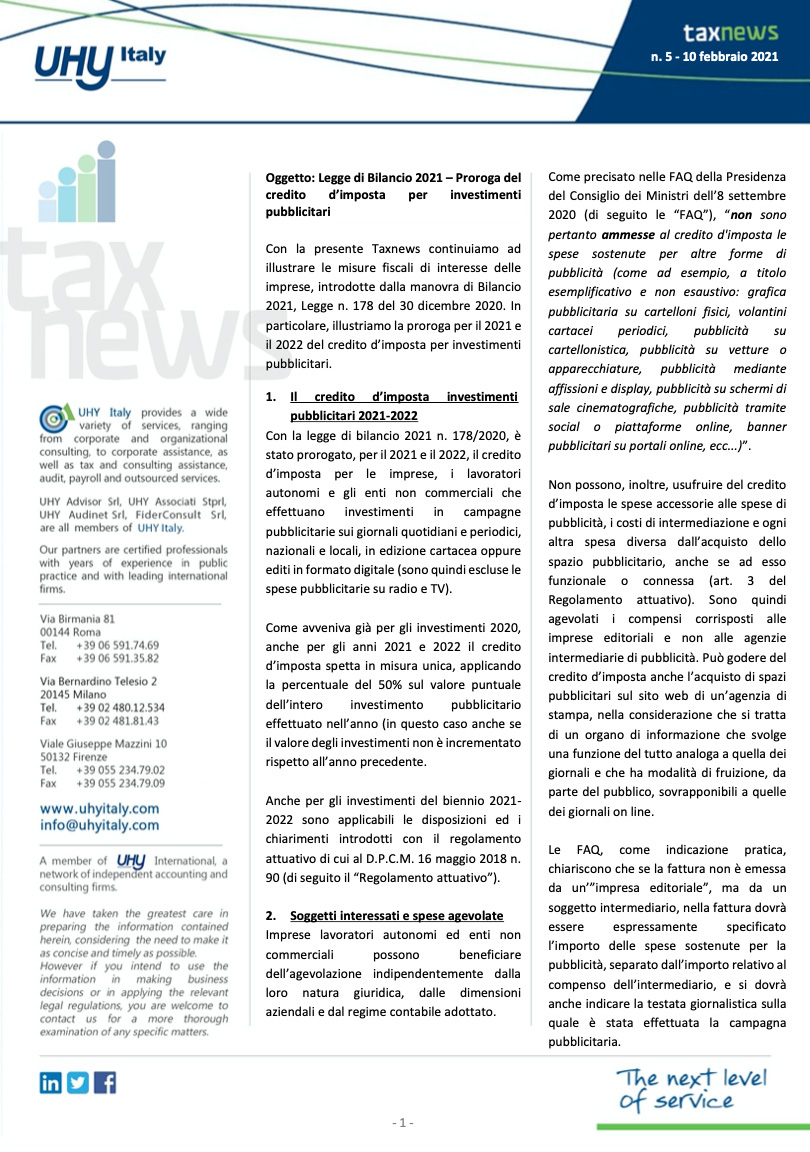

Emanuele Falorni - 10/25/2023
Tax News 2/2023
Communication by December 11, 2023 of the beneficial owner’s data
In this issue of our Taxnews we inform you on the effective start of the Register of Beneficial Owners, involving all the businesses with legal personality, private legal persons and trusts and similar institutes.
1. The start of the Register and the subjects involved
With the publication on the Official Gazette no. 236 of October 9, 2023 of the Decree dated September 29, 2023 of the Ministry of Enterprises and Made in Italy, certifying the effectiveness of the system for reporting data and relevant information on the beneficial owner (pursuant to art. 3 of Ministerial Decree 55/2022), it has been set the deadline of December 11, 2023 by which the beneficial owners’ data must be entered into the new Register.
Very briefly, the following are required to communicate the beneficial owner to the new Register:
- companies with legal personality (therefore corporations and cooperatives);
- private legal persons (associations, foundations and other private institutions which acquire the legal personality by entering the register of the legal persons);
- trusts producing legal effects relevant to tax purposes and trust-like legal arrangements (entities and arrangements that, by their structure and functions, produce legal effects equivalent to those of express trusts).
2. How to identify beneficial owners
According to EU rules and anti-laundering legislation, it is recalled that the beneficial owner is the natural person who carries out a transaction or activity or, in the case of a legal entity (which includes companies), the natural person who ultimately owns or controls it or is the final beneficiary of it. The beneficial owner coincides with the natural person(s) who ultimately owns or controls the entity/company either directly or indirectly. There may be therefore more than one beneficial owner.
In the case of corporations:
- direct ownership of more than 25% of the capital, held by a natural person constitutes an indication of ownership;
- indirect ownership of more than 25% of the capital, held through subsidiaries, trusts or intermediaries constitutes ownership.
In cases where examination of the ownership structure does not make it possible to unambiguously identify, by means of the above-mentioned quantitative criterion, the natural person(s) to whom direct or indirect ownership of the entity is attributed, the beneficial owner shall be the natural person(s) whom, in the final instance, are attributed control of the entity by virtue of:
- control of the majority of the votes exercisable at an ordinary shareholders’ meeting;
- control of sufficient votes to exercise a dominant influence in the ordinary shareholders' meeting;
- the existence of particular contractual constraints permitting the exercise of a dominant influence.
If attribution is not possible even with these criteria, the beneficial owner is the natural person(s) with powers of legal, administration or management representation of the entity.
The beneficial owner of private legal persons (such as, for example, recognized foundations and associations, i.e. having legal personality) is the natural person(s) performing at least one of the following roles:
- the founders, if alive;
- the beneficiaries, when identified or easily identifiable;
- the holders of management and administration functions.
The beneficial owner of trusts and trust-like legal arrangements is the natural person performing one of the following roles:
- the settlor(s);
- the trustee(s);
- the guardian(s) (if existing);
- the beneficiaries or, if not yet determined, the categories of persons in whose main interest the trust is established;
- any other natural person who ultimately exercises control over the trust through direct or indirect ownership or by other means.
Sole ownerships and partnerships do not have to report the beneficial owner, because these entities do not have legal personality. As of today, unrecognised foundations and associations should not have to report either (official confirmation from the MEF is pending).
3. Enterprises incorporated after October 9, 2023
Enterprises with legal personality and private legal persons which have incorporated after October 9, 2023 (date of publication of the Decree under comment) must make the disclosure within 30 days from the registration in the Registers. Similarly, trusts and similar legal entities incorporated after October 9 must make the disclosure within 30 days from their incorporation.
4. Procedures for the new communication
For the enterprises with legal personality (e.g. companies), it is the directors’ responsibility to provide information on beneficial ownership. For the private legal persons (e.g. foundations), the founder, if alive, or those entrusted with representation/administration must provide this information.
In the case of trusts or equivalent, the obligation is fulfilled by the trustee. Data and information on beneficial ownership shall be provided by means of a self-declaration, using the single business communication form. The communication must be made to the Companies Registry Office of the territorially competent Chamber of Commerce.
Any changes in respect of data and information on the beneficial owner must be reported within 30 days from the act giving rise to the change. It is also necessary to confirm once a year data and information already transmitted within 12 months from the first communication or the last communication of the change or from the last confirmation. Companies with legal personalities may perform the confirmation at the same time as filing the financial statements, attached to the relevant file. The fulfilments are telematic and exempt from stamp duty.
The file of the beneficial owner communication, digitally signed by the obligor, must be transmitted by a subject authorized to send it electronically, which may be the obligor itself or an authorized intermediary. It is not possible to delegate the digital signature of the communication to a professional (who may, however, assist the obligor in completing and sending the file).
Therefore, the subjects obliged to make the communication in question (the company’s director or, for the private legal persons, the founder or a person entrusted with representation and administration, or the trustee) must be equipped with a digital signature device, if they do not have already one. A certified electronic address (pec) is also required in order to be able to receive all communications relating to compliance.
We will be happy to provide our Clients assistance in identifying the beneficial owners of the entities/companies, in preparing and electronically submitting the communication of the beneficial owners to the Chamber of Commerce and in the preparatory acquisition of the digital signature by the directors/registered subjects submitting the communication in this regard.
